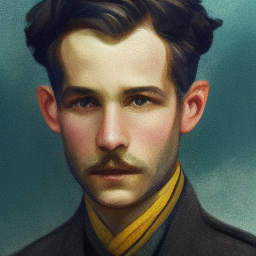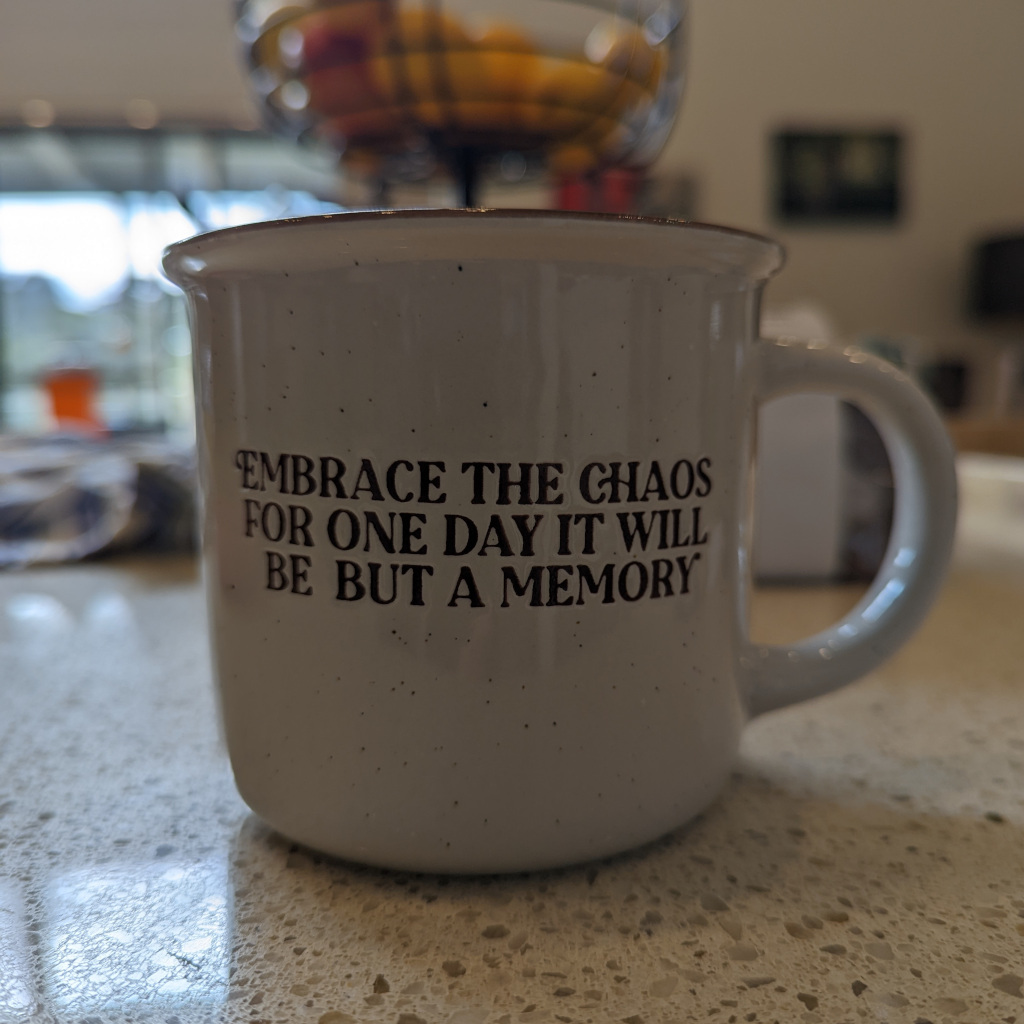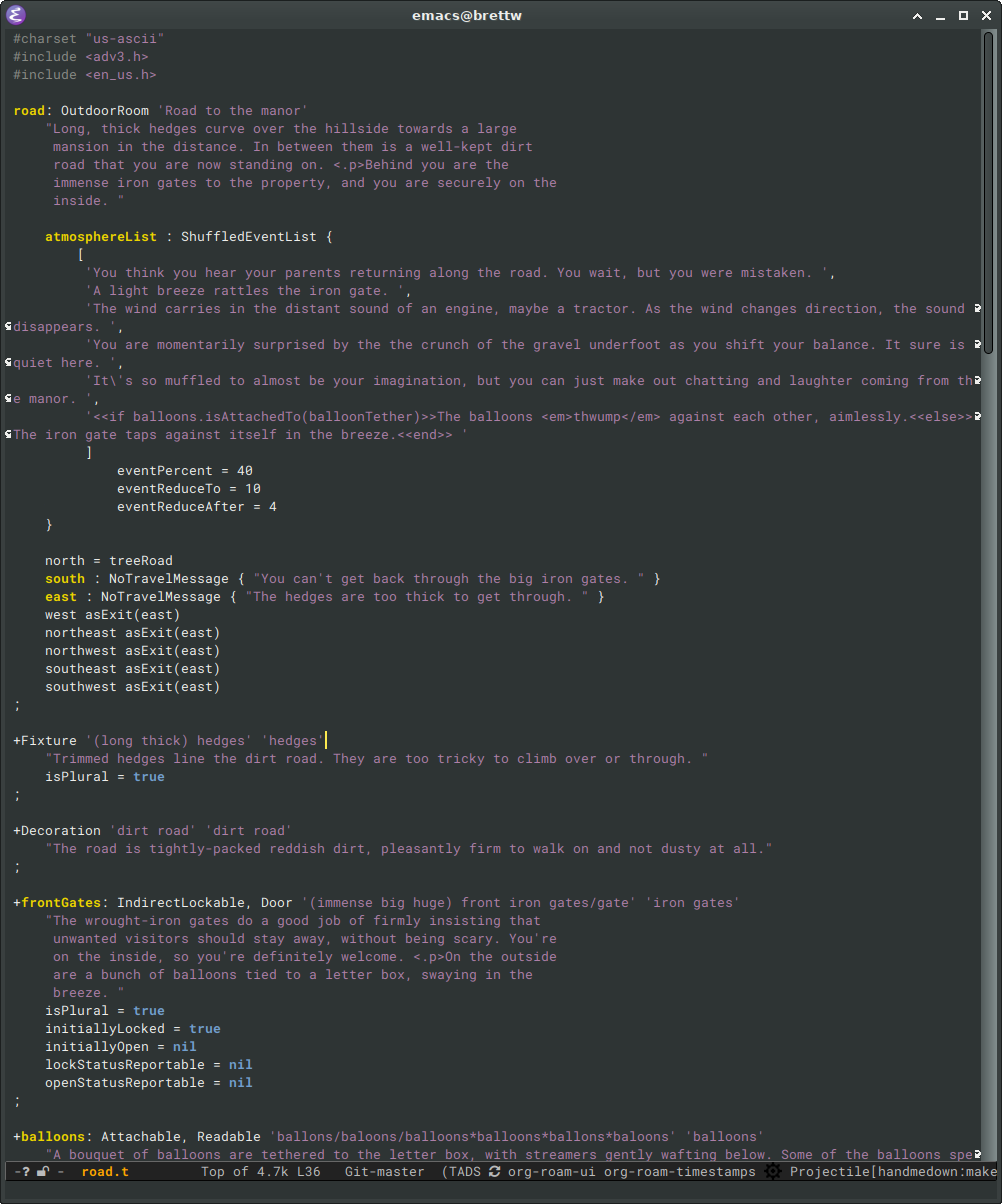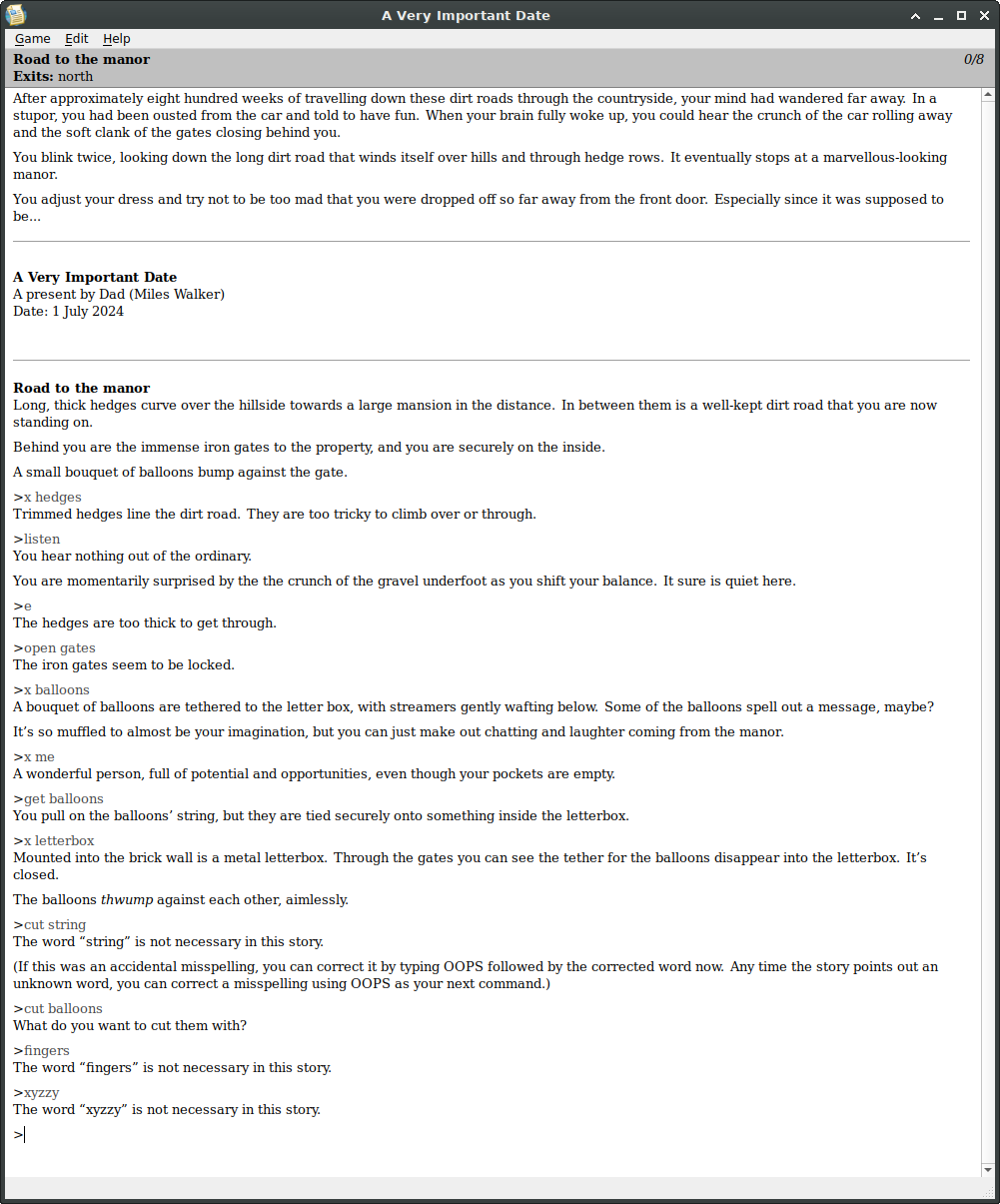The Creative Process #2 - And One Makes Four
Welcoming a new bub, and working/being inspired around the edges of parenthood.
This month we passed the inevitable event horizon and my wife gave birth to my son. Everyone is doing well and handling the roller coaster as best we can. I’m very proud of my wife and my daughter.
My son is a cool little dude. He’s reasonably attentive and inquisitive for a potato — he likes hearing birds and planes, and contorts himself to stare up at your face. He’s still working out his hands, his legs, his eyes and his voice. There’s been at least two instances of friendly fire during nappy changes. If I describe how he smells after vomiting, you may never eat yoghurt again*. We love him very much.
We try to keep our children off social media as much as we can, hence dancing around details or photos. It took us a while to decide his name. I asked an AI to generate an interpretation of his name, and the results are quite handsome.

I believe my son is in reality quite handsome, so perhaps the AI is onto something.
I’m happy, my sleep is a jumble, but I’m happy. Am I creative though? Despite the chaos, it’s been a productive month.

What I Did other than welcome a new human to the world
My main focus was to continue to work on my interactive fiction piece, Hand Me Down. The goal was to submit it to IF Comp 2022. This piece is on one level about a father giving games to his daughter.
I mentioned it in previous newsletters, but I’ll recap. I’ve long been interested in interactive fiction. I wrote my first public piece Mix Tape in September 2005, submitted it very under-baked to IF Comp 2005, and got so embarrassed by the mistake that I avoided interactive fiction for nearly a decade and a half.
Part of my month was reintegrating myself into the interactive fiction (IF) community and rediscovering IF game development. I continue to use TADS 3, even though Inform 7 and Twine are wildly more popular. I’m a programmer so TADS 3 works better for me. In fact, when I wrote Mix Tape, I had done a incidental bit of programming, maybe as much programming as I had written poetry (that is, mostly as a teenager and it was terrible). In the 17 years since, I’ve done a lot of programming and can approach Hand Me Down with a much greater expertise.
One of the greatest assets to the IF community is Emily Short and her blogs. She’s definitely moved on from parser IF, but her back catalogue is still phenomenal reading, full of tips for all sorts of interactive fiction.
As someone more experienced in programming, projects and self-evaluation than I was back then, I hope that Hand Me Down can be a decent and solid piece. To that end, am I ready for IF Comp 2022 which is due in September?
Nope. And that’s okay. This month I found a great interview with the prolific IF reviewer and game maker, Mathbrush. He put a lot of weight on substantial player testing for the recent ParserComp success of his game The Impossible Stairs (which I helped beta-test!)
I was thinking at the time whether I work harder and cut content mercilessly to reach the IF Comp 2022 deadline. (I swear but cannot confirm) Mathbrush had sagely suggested “Don’t release until it’s ready”. Hand Me Down won’t be ready. It can’t be ready. I took that as a sign from the IF Gods, and convinced myself that Hand Me Down is for release in 2023. I’ve noticed a few other authors on Twitter make the same decision.
As an aside, I was ego-surfing my contributions to IF before I ran away from the community. Turns out I’ve beta-tested a whole bunch of games, including some notable ones. I’m in two books about games and culture. I incidentally got mentioned in an academic paper about LambdaMOO. What ever happened to that guy Brett? Oh well.
Hand Me Down intends to explore that tension between the mark you intend to make with your life, and the one you do make.
Back into the meat-and-potatoes of creative work, I’ve been writing away at Hand Me Down. I’ve written some decent prose, implemented some objects and shaped the project into something progressively better.
To give an idea of what this looks like, I write this (not-at-all polished prose/code caveats apply):

To get a game that plays like:

Writing descriptions is hard, though. Turns out in a game that is only text, you have to write a lot of text. Descriptions in IF are a little different than they are in straight prose. A description has to be evocative and interesting, but terse because a player may see it hundreds of times. It has to inform the player about the world and lead them where you’ve put effort, and not lead them astray. And it can’t be too formulaic.
To aid in my slide back into IF, I’ve been replaying Cragne Manor, the insane and amazing parser fiction game made by stitching together the collaborative work of 84 authors. Each contributor was given a single space in a Lovecraftian setting to implement. Some are simple rooms with a minor puzzle in them. Others are vast swathes of content, as big as some whole games. Playing through Cragne Manor is both instructive in examples of how to write IF content, and just damn fun. You can play it online.
All in all, Hand Me Down is progressing decently, but I owe it to myself to give it time, polish and a number of extra eyeballs. And I want to give all my puzzles that extra shine of polish…
Me, yesterday, implementing an IF puzzle involving rope: I am a genius. I don't know what everyone was worrying about.
— Brett Witty (@BrettWitty) 12:32 PM ∙ Aug 23, 2022
Me, today, looking at the puzzle: Oh no.
Technical Creativity
I’m a mathematician by trade and a programmer by experience. I’ve always been interested in tech. In around the dirty nappies and Hand Me Down, I’ve had a little dabble in bringing tech to my creative projects.
Text-to-image generators
Everyone and their dog (8K, Octane, trending on Artstation) have been exploring text-to-image generators lately. It feels like a Cambrian explosion of art, ideas and ethical questions.
I haven’t yet resolved my position on the ethics. I feel concerned reading about Copilot’s use of public and private code repositories, and the text-to-image repositories used maybe without correct permissions. Then again, much of art is unattributed reference. The joke (*) above is a tweak on a killer punchline in Chuck Palahniuk’s short story Guts. When I create anything artistic, it comes from a melange of influences, conscious and unconscious, paid and unpaid. I can’t resolve this cognitive dissonance.
A temporary idea to play with is that of tool-led revolutions versus concept-driven ones:
I think about this too often.
— Steven Sinofsky (@stevesi) 9:57 PM ∙ Aug 11, 2022
I hope in exploring these tools, we can understand new concepts, or revise our old ones. It’d be nice if the big companies paid for what they took, though.
I’ve explored Midjourney, Disco Diffusion and Stable Diffusion this month. Midjourney’s brief beta variant was phenomenal, and got me to increase my subscription. Then they took it away, so much for centralization. Stable Diffusion is also incredible and able to be run on my own machine. Ideally I’d write some scaffolding tools around Stable Diffusion to make it easier for me to experiment.
It’s darkly amusing that to deal with NSFW generation, the AI pipeline includes a “NSFW detector” and blanks the output if it gets suspicious. Narc’d on by a nonlinear function.
Disco Diffusion was interesting. The results came out poorer for my minimal time investment, but the code was supported by Jina AI, ran on my machine, and I was surprised to see their very proactive community leaders embrace and encourage newbies.
All in all, I can’t quite get any of the models to give me exactly what I want yet, but then again, prompt engineering is a new and interesting field and I have only just dipped my toe in the water.
I've been exploring using Diffusion text2image models to create incidental art for my game. Sometimes the results are awesome, but not exactly what I wanted. I'm tempted to change my text/game to match the AI image, rather than the other way around.
— Brett Witty (@BrettWitty) 12:39 PM ∙ Aug 23, 2022
Text Generation
I’m a little bit of a polymath — interested in both the hard sciences and the arts. It does take mental gear shifts to go between them. I went hard into maths and programming in the late 2000s and I feel that my prose suffered considerably.
I have a substantial corpus of text of my own writing, some of which I’d even stand by to this day. Whilst staring at an unfinished room description for Hand Me Down, I idly wondered if I could get an AI to do it for me. It’d be vaguely ethical (tuned to my text, but trained on the rest of the universe), and I’d use it as an assist, not as a replacement for me doing the work.
I found a beautiful Python module called aitextgen (https://docs.aitextgen.io/) which utilises Huggingface models to do easy local text generation with deep learning models. I grabbed some of my old blog posts and stories, cleaned out metadata cruft, fine-tuned some models and generated some text…
All these deep learning models have a character. Image generators like doing spacy, abstract landscapes. Text generators like GPT-3 take the idea of “Yes, and…” to a nearly sociopathic degree.
My experiments in a text AI assistant stumbled when I couldn’t get them to shut up and write to spec. They’d wax lyrical for paragraphs on end, inventing all sorts of dumb objects that I’d have to implement.
I have ideas to get around this problem, but the work involved and the requisite editing afterwards… I might as well just grit my teeth and write the descriptions myself.
Inspirations
One of the big sources of inspiration this month was Narrascope, a conference celebrating narrative games. This technically took place at the end of July, but because my being in Australia, I didn’t get to watch any of it until August. I sadly also didn’t get to do anything, so it’s strictly outclassed by my favourite conference, the Roguelike Celebration.
Aaron A. Reed’s keynote talk on “5 Lessons from 50 Years of Text Games” was incredible, following on from his similarly-incredible posts on Substack: 50 Years of Text Games. I backed the Kickstarter, I have several copies of his procedurally generated book Subcutanean, and loved his game Blue Lacuna. The talk was full of text games that I enjoyed over the years, but also insights into that world as a player and designer.
I was surprised to be inspired by Geoffrey Golden’s “Inbox Adventure” talk, about his set of games called Adventure Snack, again on Substack. In short, he has short, regular Choose-your-own-adventure-style games that begin in a Substack email, but end on his website. You can explore all of the games as you like, replay them, and discuss your choices in the comments. Low tech, high effectiveness.
I was so inspired by this idea that I figured out what I’d need to do if I wanted to run my own version of this. I could write some simple code to host them on Substack and my own servers. Quite achievable, I believe.
I wonder very loudly if anyone would be interested in coffee-length games like that from me, and subtly motion towards the comments section. Ahem.
In my sleep deprivation, I hashed out some ideas of episodes of “Dadventures” — micro games about being a Dad. This might be a little too much “Write what you know”. But then again I saw this advice this month:
By @simonsarris.
— Michael is revising 1st draft of metascience essay (@michael_nielsen) 9:46 PM ∙ Aug 6, 2022
I often feel like I accidentally write what I don't know.
Dadventures are my current life, but it’s also what I’m learning and thinking about. It’d be easy to have different themed games, in any case.
Winding my way back up the thought stack, I have many more Narrascope videos to watch, and they are all dangerously inspiring.
Podcasts
My role for the last month has been taking care of the household chores, and occasionally taking the little man for a walk to give my poor wife a rest. These are both perfect for podcasts.
If you’re creative, I wholeheartedly recommend Ben Folds’ podcast Lightning Bugs. He has a variety of guests from all over the arts and sciences, talking about creativity. One episode I relistened to was his podcast with Penn Jillette from the magic duo Penn and Teller. Their discussion was very frank and insightful, especially about art, improvisation and routine.
Another episode of Lightning Bugs interviewed Rainn Wilson of The Office fame, and they spoke about their experiences finding their voice and career, and how you instill a character with a voice. Doubly interesting is that Rainn Wilson co-hosts his own podcast, “Metaphysical Milkshake”, and they did a reversal by having Ben Folds as a guest. This had a different blend of insight versus humour, but still well worth it.
A friend of mine, Alice Allan is an actual, real-life poet, and she runs a charming podcast about poetry called “Poetry Says”. I love hearing poets talk. They have exquisite word choice, even when they are just talking shenanigans. Listening to stories and opinions about the Australian poetry scene just lifts my literary heart and I hope it lifts my writing.
In a neat mirror-smashing moment of the Poetry Says podcast I was listening to, after a month of reading many Substacks, thinking about this newsletter and being inspired by podcasts, Alice and her guest Ursula moaned about how “a guy with a Substack” was a thing, just after I thought “I gotta mention this in my Substack”.
Oh no! 😅
Wrap-up
I’m enjoying my expanded fatherhood role and it hasn’t completely obliterated my creative outlets. These meandering posts are a good bit of ballast, grounding and reinforcing my creative pursuits during the month. I hope they are interesting to read about.
I’m always looking to improve the posts. If you are interested in providing constructive feedback, perhaps in exchange for a coffee, let me know (brettwitty@substack.com). I’ve opened up the comments sections for all posts.
If you like the idea of tiny games you can play via email and your browser, let me know.
Please be encouraged to share these posts with anyone.
Have a great month full of cool discoveries, inspirations and unbroken sleep.